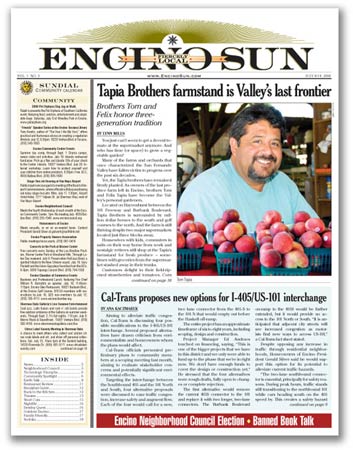
VOL. 1 NO. 3 EncinoSun JULY 8-14, 2006
Tapia Brothers farmstand is Valley’s last frontier
Brothers Tom and Felix honor three generation tradition
BY LYNN MILLS
You just can’t seem to get a decent tomato at the supermarket anymore. And who has time (or space) to grow a vegetable garden?
Many of the farms and orchards that once characterized the San Fernando Valley have fallen victim to progress over the past six decades.
Yet, the Tapia brothers have remained firmly planted. As owners of the last produce farm left in Encino, brothers Tom and Felix Tapia have become the Valley’s personal gardeners.
Located on Hayvenhurst between the 101 Freeway and Burbank Boulevard, Tapia Brothers is surrounded by million dollar homes to the south and golf courses to the north. And the farm is still thriving despite two major supermarkets located just three blocks away.
Housewives with kids, commuters in suits on their way home from work and nostalgic retirees still shop at the Tapia’s farmstand for fresh produce – sometimes with groceries from the supermarket stashed away in their trunks.
Customers delight in their field-ripened strawberries and tomatoes. Corn is their biggest crop – the only one they send to market.
“ We grow most all our vegetables: corn, tomatoes, beans, squash, peppers, cucumbers, whatever vegetable you see here, we grow ourselves,” says Tom. The brothers lack an orchard of their own, but they insist on selling only locally grown tree fruit.
The farmstand is rustic and authentic, not kitschy. A cage of surprisingly beautiful roosters and a pheasant with vibrant feathers add to the countrified feel. Across Hayvenhurst, you can see 70 acres of farmland; the Tapias own another 30 acres at White Oak and Victory, as well as pumpkin fields near Lancaster.
For many families, Tapia Brothers is part of a holiday tradition. They come for Halloween pumpkin picking. And for the fire-roasted corn, cider and vintage farm wagons. A giant fiberglass pumpkin is a great photo op and is usually crawling with children. It doesn’t stop there - the Tapias borrow animals from Antelope Valley ranches for a petting zoo, and even erect a spookhouse and maze.
In December, customers tramp through a forest of Christmas trees and sawdust, warming themselves with hot cocoa as they search for the perfect tree.
The Tapia family has been farming in the San Fernando Valley for three generations.
Tom Tapia grew up on the family ranch nearby (Lake Balboa sits there now), and he and his brothers graduated from Notre Dame High School in Sherman Oaks. evelopment squeezed them out, so they moved to Valencia– wide open land at the time. They lasted there 12 years, until Valencia grew. In 1984, Tom and Felix bought the present site, formerly Maria’s Cornstand, built in the early 1970s.
Tom says people have offered to buy them out, but the Tapias don’t own the land. It’s part of the Sepulveda Basin flood control project and they lease it from the Army Corps of Engineers. The Sepulveda Basin is home to acres of parks, golf courses, bike paths, hiking trails and wetlands.
“Right now we’re safe, because they can’t do much development other than parks and golf courses. I think they’ve already built enough parks — for now,” says Tom.
Being in a flood zone makes winter growing impossible. The cornfield at White Oak and Victory is nicknamed the “hole” because it fills up with water during winter rains. The water leaves the soil rich, but loaded with trash and debris carried by the Los Angeles River.
“When the water recedes, we’re stuck with Styrofoam cups, plastic… it’s just a mess. It takes us days to clean it out, and then we have to plow under,” says Tom.
Pesticide regulations, water costs, and runoff water monitoring make it tough for the small farmer, he notes. Traffic is one of their biggest problems. “We’ve got to get out to the field early and when we try to bring our crops back over here to pack, just crossing the street here at Hayvenhurst is a nightmare.”
Despite the drawbacks – and against the odds – the Tapias haven’t given up their way of life.
“I’m an outdoors person. I would never want to sit at a desk or in front of a computer all day,” Tom says. “You get a lot of satisfaction planting something, taking care of it, watching it grow, harvesting it and watching other people enjoy eating it.”
Many customers have been coming to the farmstand since it was Maria’s.
“It’s wonderful!” enthuses Juliette Hamille, a customer for over 20 years. “It reminds me of the farm I grew up on in France.” She looks wistfully across Hayvenhurst at the crops. “I like to watch them grow. I want to walk through their fields. I would love to go there and dig and plant.”
Sadly, the next Tapia generation isn’t interested in continuing the tradition. “Once we retire, that’s it,” says Tom. “I don’t think anybody’s going to follow in our footsteps. It’s a tough business.”
He surveys his fi elds with satisfaction. “It’s a hard life. But it’s a good life, too.”
Tapia Brothers is open 9:00 a.m. to 6:00 p.m. Monday through Saturday, and 9:00 to 5:00 or 6:00 on Sunday.